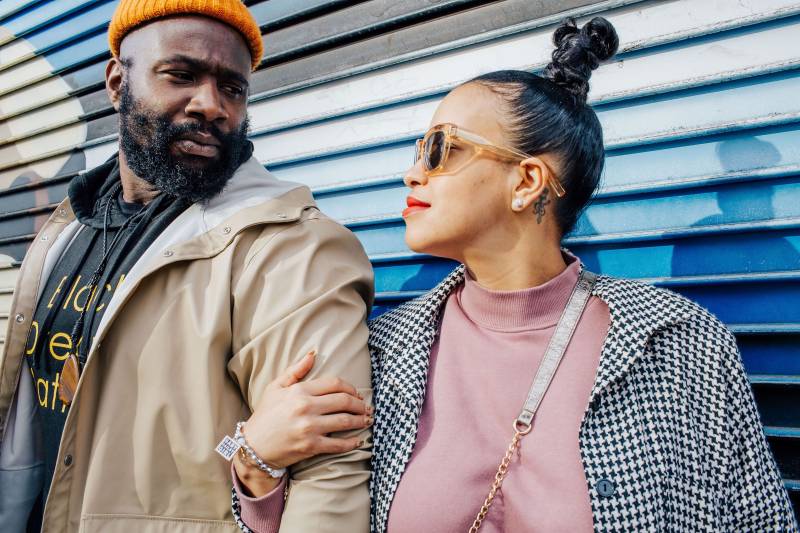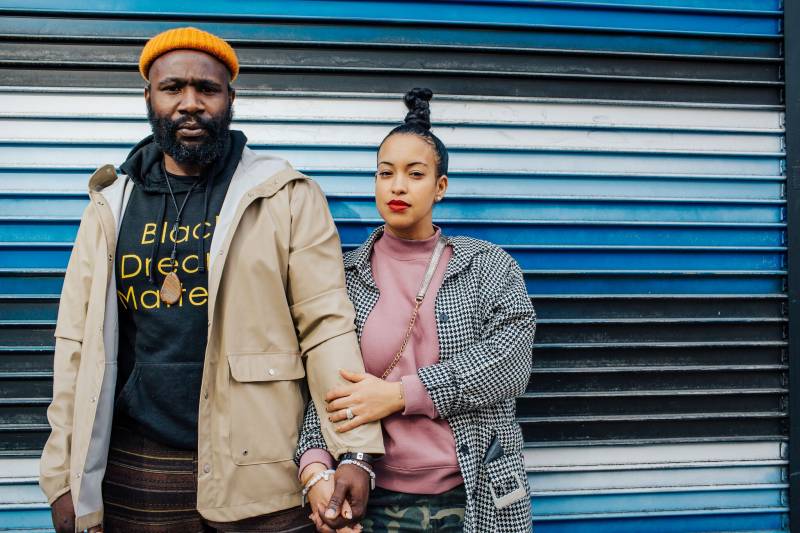When Felicia Gangloff-Bailey and Karega Bailey’s newborn daughter, Kamaiu, passed away last year, the couple says they became “angel parents.” It’s a term that exemplifies their seemingly ever-present optimism and uplifting approach to dealing with grief.
This mindset is something the duo brings to their professional life as well, working as educators and restorative justice practitioners. They’re also musicians, making up half of the band, Sol Development, along with Brittany Tanner and Lauren Adams.
Recently, Felicia and Karega worked to publish a book full of affirmations that can be used as a toolkit, of sorts, to give guidance to other people who are dealing with grief. The book is call Sol Affirmations.
This week on Rightnowish, we’re discussing the importance of understanding grief and how uplifting words help process the highs and lows that life can throw at you.

Below are lightly edited excerpts of my conversation with Felicia and Karega Bailey.
Karega: So, Sol Affirmations is this body of work that lends itself and is birthed from some of the greatest challenges around loss, around grief, but also around light and around love. The amount of love that shows up in this text is unreal. I recently did an assessment looking at how much time I was examining love and you realize that grief is love, it’s just love after a loss. It’s very difficult to name love and feel love and practice love without you being able to place it in the direction where you intended it to go.
Pen: On the note of just affirmations in general. A quick Google search of affirmations doesn’t show Black folks. A quick Instagram and Twitter search of the word “affirmation” doesn’t show Black folks. But I know for a fact Black folks use affirmations. I use them all the time. Like Jadakiss’s “We Gonna Make It” comes to mind.
Felicia : I think it’s really dope that you bring that up, because from what I understand about the power of music, in particular of hip hop, there is this connection that, once it’s made available, opens a pathway to so much regarding choice behaviors.
Karega: I don’t know how they sanitized our melanin from the space of affirmations and mindfulness, but we belong there. These things have been with us forever. We have oral tradition, right? We have griots. We are orators in nature…
Pen: In 2019, you put the album out. You also are doing the work of working with mothers who’ve lost children to gun violence, and you all are expecting a child. Bring me back to that experience.
Felicia: 2019 at the beginning of the year. So much to celebrate, Karega had a birthday. I told him we were expecting on his birthday. You know, and then. Shortly after a month later, a little under a month later, we released this album that we had been working so hard on for so long. That was so special, I think, for me to be with child in such a time where our music is taking off. We had so many opportunities to perform. I mean, so many. It’s almost a blur for me right now…

Karega: I had so much joy every single day and so many of our performances and so many of our press spaces, Felicia and I would just hold this very warm eye contact just thinking that our child is here witnessing all of this, experiencing all of this. And then the birth of Kamaiu, and that also represents the birth of Felicia as a mother. And that also represents the birth of me as a father. But then we also have a very new experience in that we’re birthed into being angel parents.
Felicia: I was reflecting yesterday, Karega and I were kind of talking about a couple that reached out to us. She opened this identity up for me. She was the first person that [introduced] “angel parents.”
Felicia: At first it was something that I didn’t really want to accept. All of our birth stories are different. We share, however, the same feeling of missing the memories that we thought we would have. But I’ve come to understand that, that we are still parents. I am infinitely Kamaiu’s mother. And I’m still working that out.
Karega: We have to become better as a community at the gentleness we prescribe to the mothers. Because you wouldn’t imagine the way their wombs still hurt. It still hurts in the same place, and I’ve heard it over and over again from the mothers in the gun violence space. And then to learn that my wife has a wound that hurts in the same place, and it just really makes me want to tap everybody on the shoulder and just remind them of the power of the gentleness for some things in which you cannot understand or have words for.

Rightnowish is an arts and culture podcast produced at KQED. Listen to it wherever you get your podcasts or click the play button at the top of this page and subscribe to the show on NPR One, Spotify, Apple Podcasts, TuneIn, Stitcher or wherever you get your podcasts.


